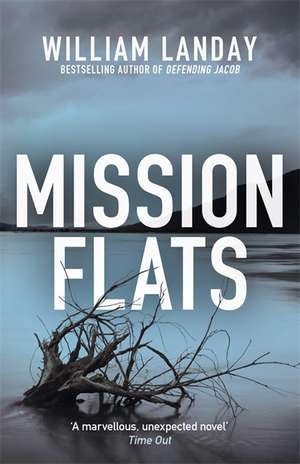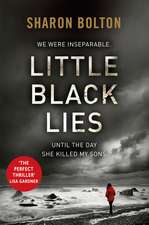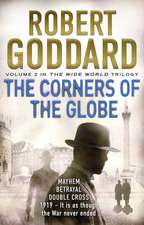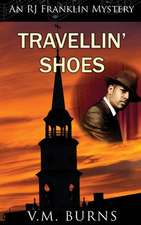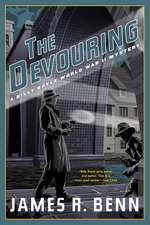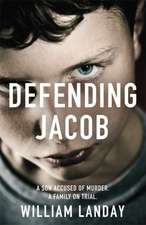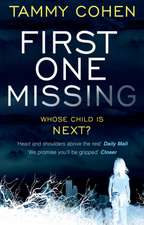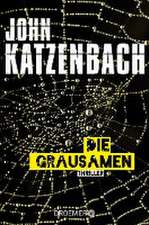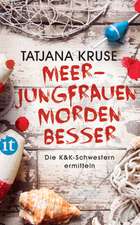Mission Flats
Autor William Landayen Limba Engleză Paperback – 25 sep 2013
“Landay writes with eloquent intensity.”—The New York Times Book Review
By a shimmering lake in western Maine, a body lies sprawled in a deserted cabin. The dead man was an elite D.A. from Boston whose beat was the city’s toughest neighborhood: Mission Flats. For local police chief Ben Truman, investigating the murder will mean leaving his quiet home and joining a vengeful manhunt in a world of hard streets and harder bargains. The cops have zeroed in on a suspect, a ruthless predator targeted for prosecution by the murdered D.A. But Ben distrusts the Boston police—especially when he uncovers a secret history of murder and retribution stretching back twenty years. As past and present collide, as tribal loyalties threaten to lynch an innocent man—or let a guilty one go free—one thing remains certain: The most powerful revelations are yet to come.
Includes an excerpt of Defending Jacob
“A crackling debut that answers the question: Who will be the next Grisham?”—Kirkus Reviews (starred review)
“An inventive, gripping suspense debut . . . Landay deals out pertinent details with the finesse of a poker player. . . . A rich, harrowing and delightful read.”—Publishers Weekly (starred review)
“[Landay’s] tale is reminiscent of his fellow Beantown writer Dennis Lehane, which is a true compliment.”—Rocky Mountain News
“Waiting for a new Landay novel is like waiting for a guy from Cremona to build a violin: anxious but worth it.”—Lee Child
Winner of the CWA John Creasey Memorial Dagger Award for Best First Crime Novel
| Toate formatele și edițiile | Preț | Express |
|---|---|---|
| Paperback (3) | 50.69 lei 24-35 zile | +21.95 lei 7-11 zile |
| Transworld Publishers Ltd – 31 aug 2005 | 50.69 lei 24-35 zile | +21.95 lei 7-11 zile |
| Orion Publishing Group – 25 sep 2013 | 55.20 lei 3-5 săpt. | +29.92 lei 7-11 zile |
| Bantam – 31 mai 2012 | 114.60 lei 3-5 săpt. |
Preț: 55.20 lei
Preț vechi: 70.99 lei
-22% Nou
Puncte Express: 83
Preț estimativ în valută:
10.56€ • 10.91$ • 8.79£
10.56€ • 10.91$ • 8.79£
Carte disponibilă
Livrare economică 04-18 martie
Livrare express 18-22 februarie pentru 39.91 lei
Preluare comenzi: 021 569.72.76
Specificații
ISBN-13: 9781409136200
ISBN-10: 1409136205
Pagini: 512
Dimensiuni: 129 x 196 x 33 mm
Greutate: 0.34 kg
Editura: Orion Publishing Group
ISBN-10: 1409136205
Pagini: 512
Dimensiuni: 129 x 196 x 33 mm
Greutate: 0.34 kg
Editura: Orion Publishing Group
Notă biografică
William Landay was an assistant district attorney before he turned to writing. He lives in Boston. Visit his website www.williamlanday.com
Recenzii
A most assured debut, cleverly plotted with an unguessable ending SUNDAY TELEGRAPH Compelling...marks the blooding of a major new talent, with shades of Scott Turow GUARDIAN Landay writes with eloquent intensity...about the no-win ethical choices that can corrupt or otherwise crush a good cop NEW YORK TIMES An impressive and constantly surprising debut...the main plot twist knocks you sideways and there's more to come. A marvellous, unexpected novel TIME OUT
Extras
1
Maurice Oulette tried to kill himself once but succeeded only in blowing off the right side of his jawbone. A doctor down in Boston was able to construct a prosthetic jaw, with imperfect results. The surgery left Maurice's face with a melted appearance, and he went to great lengths to hide it. When he was younger (the accident happened when Maurice was nineteen), he wore a bandanna around his face like a bank robber in an old western. This gave Maurice, who was otherwise a mousy and unromantic sort of guy, a dashing appearance he seemed to enjoy for a while. Eventually he got tired of the bank-robber mask, though. He was always lifting it up to catch a breath of fresh air or to take a drink. So he simply discarded the thing one day, and since then Maurice has been about as unself-conscious as a jawless man can be.
Most people in town accept Maurice's deformity as if it were no more unusual to be jawless than to be nearsighted or left-handed. They are even a little protective of him, taking care to look him in the eye, call him by name. If the summer people stare, as even the adults invariably do, you can bet they'll catch an icy stare right back, from Red Caffrey or Ginny Thurler or anyone else who happens to be around, a look that says, Eyes front, mister. Versailles is a nice town that way. I used to think of this place as an enormous Venus's-flytrap with glue-sticky streets and snapping wings that snared young people like me and held us here until it was too late to ever live anywhere else. But these people have stuck by Maurice Oulette and they've stuck by me too.
They appointed me chief of police when I was twenty-four. For a few months I, Benjamin Wilmot Truman, was the youngest police chief in the United States, or so it was assumed around here. My reign was brief; later that same year, there was a story in USA Today about a twenty-two-year-old who was elected sheriff in Oregon somewhere. Not that I ever enjoyed the distinction anyway. Truth be told, I never wanted to be a cop at all, let alone police chief in Versailles.
In any event, Maurice lived in his late father's white clapboard house, subsisting on SSI checks and occasional free meals from the town's two competing diners. He'd won a settlement from the Maine Department of Social Services for negligent monitoring of his case while he shot the jawbone off his head, so he was comfortable enough. But, for reasons no one understood, the last few years Maurice had ventured out of the house less and less. The consensus in town was that he was becoming a little reclusive and maybe even a little crazy. But he had never hurt anyone (except himself), so the general view was that whatever Maurice Oulette did out here was nobody's business but his own.
I tended to agree with that position too, though I drew one exception. Every few months, with no warning, Maurice decided to use the streetlights on Route 2 for target practice, to the great distress of motorists traveling between Millers Falls, Mattaquisett township, and Versailles. (The name is pronounced Ver-sales, not Ver-sigh.) Maurice was usually lit on Wild Turkey on these occasions, which may account for his poor decision-making and poorer aim. On this night--it was October 10, 1997--the call came in around ten, Peggy Butler complaining that "Mr. Oulette is shooting at cars again." I assured her Maurice wasn't shooting at cars, he was shooting at streetlights, and the odds of him hitting a car were actually very slim. "Ha ha, Mr. Comedian," Peggy said.
Off I went. I began to hear the shots when I got within a mile or two of the house. These were sharp rifle cracks at irregular intervals, once every fifteen seconds or so. Unfortunately it was necessary for me to go up Route 2 to reach the house, which meant passing through Maurice's crosshairs. I lit up the wigwags, the light bar, the alley lights, every bulb that truck had--it must have looked like a Mardi Gras float--with the hope that Maurice would hold his fire a minute. I wanted him to know it was only the police.
I parked the Bronco with two wheels on the lawn, lights flashing. At the rear corner of the house, I shouted, "Maurice, it's Ben Truman." No response. "Hey, Rambo, would you stop shooting for a second?" Again there was no response, but then, there was no shooting either, which I took to be a positive sign. "Alright, I'm coming out," I announced. "Now, Maurice, don't shoot."
The backyard was a small rectangle of scrub grass, sand, and pine needles. It was scattered with detritus of various kinds: a skeletal clothes-drying rack, a street-hockey goal, a milk crate. In the far corner an old Chevy Nova lay flat on its belly, the wheels having been transplanted to some other shitbox Chevy Nova years before. The car still had its Maine license plate, with the picture of a lobster and the motto vacationland.
Maurice stood at the edge of the yard with a rifle in the crook of his arm. The pose suggested a gentleman hunter on a break from shooting quail. He wore boots, oil-stained work pants, a red flannel jacket, and a baseball cap pulled low over the brow. His head was down, which was not unusual. You got used to addressing the button on his cap.
I shined my flashlight over him. "Evening, Maurice."
"Evenin', Chief," the cap said.
"What's going on out here?"
"Just shootin' is all."
"I see that. You about scared Peggy Butler half to death. You want to tell me what the hell you're shooting at?"
"Them lights there." Maurice nodded toward Route 2 without looking up.
The two of us stood there for a moment nodding at each other.
"You hit any?"
"Nos'r."
"Something wrong with the gun?"
He shrugged.
"Well let's have a look at it, Maurice."
He handed me the rifle, an old Remington I'd confiscated at least a dozen times. I checked that there was a round in the chamber, then pinged one off a metal fence-pole at the edge of the field. "Gun's okay," I informed him. "Must be you that's off."
Maurice gave a little murmuring laugh.
I patted down the outside of his coat, felt the box of shells in his pocket. Reaching inside, my fingers got snarled in the Kleenex balls Maurice collected there like chestnuts. "Jesus, Maurice, do you ever clean out these pockets?" I pulled out the box of ammunition and stuck it in my own pocket. A box of Marlboro reds I opened and slipped back in Maurice's coat. "Okay if I take a look around and see how you're doing out here?"
He looked up at last. The skin grafts along his concave jawline shone silvery in the flashlight. " 'M I under arrest?"
"No, sir."
"Okay then."
I went in the back door, leaving Maurice where I'd found him. He kept his arms by his sides like a scolded child.
The kitchen stank of boiled vegetables and body odor. A fifth of Jim Beam stood on the table, half empty. The refrigerator was empty save for an ancient box of baking soda. In the cabinets were a few cans (Spaghetti-O's, Green Giant corn), a few packets of powdered soup, and a tiny hole through which carpenter ants were entering and exiting.
"Maurice," I called to him, "has your caseworker been out to see you?"
"Don't 'member."
With the barrel of Maurice's rifle, I nudged open the bathroom door and shined the flashlight about. The tub and toilet were stained yellow. Two cigarette butts floated in the toilet. Beneath the sink, a section of the wall had rotted, and a piece of particle board had been nailed there to patch the hole. At the edges of the board, the ground outside was visible.
I switched off the lights and closed up the house.
"Maurice, you remember what protective custody is?"
"Yes'r."
"What is it?"
"It's when you put me in the jail but I'm not under arrest."
"That's right. And do you remember why I have to do that, put you in protective custody?"
"To protect me, I guess. That's why they call it that."
"Well, yeah. Exactly. So that's what we're going to do, Maurice, we're going to put you in protective custody before you kill someone while you're taking potshots at streetlights."
"I didn't hit none."
"Well, Maurice, that doesn't exactly make me feel better about it. See, if you hit what you were aiming at . . ."
He gave me a blank expression.
"Look, the point is, you can't shoot at them. They're town property. Besides, what if you hit a car?"
"I never shot no cars."
These conversations with Maurice only go so far, and this one had about run its course. It wasn't completely clear whether Maurice was just slow or a little crazy. Either way, he'd earned some leeway. He'd survived a maelstrom of emotions no outsider could fathom, and he had the scars to prove it.
He looked up at me. In the moonlight, with his right side in darkness, his face was restored nearly to normal. It was the sort of lean, dark-eyed face common around here. The face of a voyageur or a timberman in an old sepia photo.
"You hungry, Maurice?"
"Little."
"Did you eat?"
"Et yesterd'y."
"Want to go to the Owl?"
"Thought you were PC'ing me."
"I am."
"Do I get my gun back?"
"Nope. I'm going to have it forfeited before you shoot somebody. Like me."
"Chief Truman, I ain't gonna shoot you."
"Well, I appreciate that. But I'm going to keep it just the same because--and this is no disrespect, Maurice--you're not the greatest shot that ever was."
"The judge'll make you give it back. I got my F.I.D."
"What, are you a lawyer now?"
Maurice made his little laugh, like a moan. "Ayuh, guess so."
There were a few people at the Owl, all sitting at the bar, all drinking Bud long-necks, staring up at a hockey game on the TV. Phil Lamphier, who owned the place and in the off-season was the only bartender, was leaning on his elbows at the end of the bar, reading a newspaper. The little countertop was L-shaped, and Maurice and I slid onto stools on the short side, facing the others.
A murmur of "hey, Ben" came from the group, though Diane Harned waited a moment before greeting me as "Chief Truman." She shot me a little smirk, then returned her attention to the TV. Diane had been good-looking once, but the color had drained out of her. Her blond hair had faded from yellow to straw. Raccoon shadows had formed under her eyes. Still, she carried herself with a pretty girl's arrogance, and there's something to be said for that. Anyway, we'd had a few dates, Diane and I, and a few reunions after that. We had an understanding.
Maurice ordered a Jim Beam, which I immediately canceled. "We'll have two Cokes," I told Phil, who made a face.
Jimmy Lownes asked, "You got Al Capone here under arrest?"
"Nope. Heat's out at Maurice's house so he's going to stay over at the station tonight till we get it turned on again. We just figured we'd get something to eat first."
Diane gave me a skeptical look but said nothing.
"My taxes paying for that dinner?" Jimmy teased.
"No, I'm treating."
Bob Burke said, "Well, that's taxes, Ben. Taxes is what pays your salary, technically."
"Yours too," Diane shot back. "Technically."
Burke, who worked for the town doing maintenance in the public buildings, was sheepish. Still, I did not need Diane to defend me.
"It doesn't take a lot of taxes to pay my salary," I said. "Besides, as soon as they find a new chief, I'll be off the dole. Get my ass out of this jerkwater place finally."
Diane snorted. "And go where?"
"I've been thinking maybe I'll go do some traveling."
"Well, listen to you. Just where do you think you're gonna go?"
"Prague."
"Prague." She said the word as if she were trying it out for the first time. "I don't even know what that is."
"It's in Czechoslovakia."
Diane sniffed again, disdainful.
Bobby Burke cut in, "It's the Czech Republic now. That's what they called it on the Olympics, the Czech Republic." Burke was a master of this kind of trivia. The man eked out a living mopping floors at the grade school, but he could tell you the names of every first lady, all the presidential assassins, and the eight states that border Missouri. A man like that can throw off the rhythm of a conversation.
"Ben," Diane persisted, "why in hell would you want to go to Prague?" There was an edge in her voice. Jimmy Lownes gave her a little nudge and said, "Uh-oh," like Diane was jealous. But it wasn't that.
"Why would I want to go to Prague? Because it's beautiful."
"And what are you going to do once you get there?"
"Just look around, I guess. See the sights."
"You're just going to . . . look around?"
"That was my plan, yes."
It wasn't much of a plan, I admit. But it seemed to me I'd been planning too long already, waiting for The Opportunity. I have always been one of those long-thinking, slow-acting men, the type that smothers every idea with doubt and worry. It was time to shake free of all that. I figured I could at least get as far as Prague before my second-guessing caught up to me. I sure as hell wasn't going to rot in Versailles, Maine.
Jimmy asked, "You taking Maurice here with you?"
"You bet. Whattaya say, Maurice? Want to come to Prague?"
Maurice looked up and grinned his shy, close-mouthed smile.
"Maybe I'll go too," Jimmy announced.
Diane snorted again. "Right."
"Jeezum Crow," Jimmy said, "why not?" "Why not? Look at yourselves!"
We looked but none of us saw anything.
"It's just, you guys aren't exactly Prague people."
"What the hell does that mean, 'Prague people'?" Jimmy Lownes could not have found Prague on a map if you gave him a week to look. But his indignation was genuine enough. "We're people, aren't we? All's we have to do is go to Prague and we'll be Prague people."
"Jimmy, really, what the hell are you going to do in Prague?" Diane persisted.
"Same as Ben: have a look around. I might even like it. Who knows, maybe I'll stay over there. Show you what Prague people I am."
"They have good beer," Bob Burke chimed in. "Pilsner beer."
"See, I like it already." Jimmy raised his Bud bottle in salute, though it was not clear whether he was saluting Prague or Bobby Burke or just beer.
Maurice Oulette tried to kill himself once but succeeded only in blowing off the right side of his jawbone. A doctor down in Boston was able to construct a prosthetic jaw, with imperfect results. The surgery left Maurice's face with a melted appearance, and he went to great lengths to hide it. When he was younger (the accident happened when Maurice was nineteen), he wore a bandanna around his face like a bank robber in an old western. This gave Maurice, who was otherwise a mousy and unromantic sort of guy, a dashing appearance he seemed to enjoy for a while. Eventually he got tired of the bank-robber mask, though. He was always lifting it up to catch a breath of fresh air or to take a drink. So he simply discarded the thing one day, and since then Maurice has been about as unself-conscious as a jawless man can be.
Most people in town accept Maurice's deformity as if it were no more unusual to be jawless than to be nearsighted or left-handed. They are even a little protective of him, taking care to look him in the eye, call him by name. If the summer people stare, as even the adults invariably do, you can bet they'll catch an icy stare right back, from Red Caffrey or Ginny Thurler or anyone else who happens to be around, a look that says, Eyes front, mister. Versailles is a nice town that way. I used to think of this place as an enormous Venus's-flytrap with glue-sticky streets and snapping wings that snared young people like me and held us here until it was too late to ever live anywhere else. But these people have stuck by Maurice Oulette and they've stuck by me too.
They appointed me chief of police when I was twenty-four. For a few months I, Benjamin Wilmot Truman, was the youngest police chief in the United States, or so it was assumed around here. My reign was brief; later that same year, there was a story in USA Today about a twenty-two-year-old who was elected sheriff in Oregon somewhere. Not that I ever enjoyed the distinction anyway. Truth be told, I never wanted to be a cop at all, let alone police chief in Versailles.
In any event, Maurice lived in his late father's white clapboard house, subsisting on SSI checks and occasional free meals from the town's two competing diners. He'd won a settlement from the Maine Department of Social Services for negligent monitoring of his case while he shot the jawbone off his head, so he was comfortable enough. But, for reasons no one understood, the last few years Maurice had ventured out of the house less and less. The consensus in town was that he was becoming a little reclusive and maybe even a little crazy. But he had never hurt anyone (except himself), so the general view was that whatever Maurice Oulette did out here was nobody's business but his own.
I tended to agree with that position too, though I drew one exception. Every few months, with no warning, Maurice decided to use the streetlights on Route 2 for target practice, to the great distress of motorists traveling between Millers Falls, Mattaquisett township, and Versailles. (The name is pronounced Ver-sales, not Ver-sigh.) Maurice was usually lit on Wild Turkey on these occasions, which may account for his poor decision-making and poorer aim. On this night--it was October 10, 1997--the call came in around ten, Peggy Butler complaining that "Mr. Oulette is shooting at cars again." I assured her Maurice wasn't shooting at cars, he was shooting at streetlights, and the odds of him hitting a car were actually very slim. "Ha ha, Mr. Comedian," Peggy said.
Off I went. I began to hear the shots when I got within a mile or two of the house. These were sharp rifle cracks at irregular intervals, once every fifteen seconds or so. Unfortunately it was necessary for me to go up Route 2 to reach the house, which meant passing through Maurice's crosshairs. I lit up the wigwags, the light bar, the alley lights, every bulb that truck had--it must have looked like a Mardi Gras float--with the hope that Maurice would hold his fire a minute. I wanted him to know it was only the police.
I parked the Bronco with two wheels on the lawn, lights flashing. At the rear corner of the house, I shouted, "Maurice, it's Ben Truman." No response. "Hey, Rambo, would you stop shooting for a second?" Again there was no response, but then, there was no shooting either, which I took to be a positive sign. "Alright, I'm coming out," I announced. "Now, Maurice, don't shoot."
The backyard was a small rectangle of scrub grass, sand, and pine needles. It was scattered with detritus of various kinds: a skeletal clothes-drying rack, a street-hockey goal, a milk crate. In the far corner an old Chevy Nova lay flat on its belly, the wheels having been transplanted to some other shitbox Chevy Nova years before. The car still had its Maine license plate, with the picture of a lobster and the motto vacationland.
Maurice stood at the edge of the yard with a rifle in the crook of his arm. The pose suggested a gentleman hunter on a break from shooting quail. He wore boots, oil-stained work pants, a red flannel jacket, and a baseball cap pulled low over the brow. His head was down, which was not unusual. You got used to addressing the button on his cap.
I shined my flashlight over him. "Evening, Maurice."
"Evenin', Chief," the cap said.
"What's going on out here?"
"Just shootin' is all."
"I see that. You about scared Peggy Butler half to death. You want to tell me what the hell you're shooting at?"
"Them lights there." Maurice nodded toward Route 2 without looking up.
The two of us stood there for a moment nodding at each other.
"You hit any?"
"Nos'r."
"Something wrong with the gun?"
He shrugged.
"Well let's have a look at it, Maurice."
He handed me the rifle, an old Remington I'd confiscated at least a dozen times. I checked that there was a round in the chamber, then pinged one off a metal fence-pole at the edge of the field. "Gun's okay," I informed him. "Must be you that's off."
Maurice gave a little murmuring laugh.
I patted down the outside of his coat, felt the box of shells in his pocket. Reaching inside, my fingers got snarled in the Kleenex balls Maurice collected there like chestnuts. "Jesus, Maurice, do you ever clean out these pockets?" I pulled out the box of ammunition and stuck it in my own pocket. A box of Marlboro reds I opened and slipped back in Maurice's coat. "Okay if I take a look around and see how you're doing out here?"
He looked up at last. The skin grafts along his concave jawline shone silvery in the flashlight. " 'M I under arrest?"
"No, sir."
"Okay then."
I went in the back door, leaving Maurice where I'd found him. He kept his arms by his sides like a scolded child.
The kitchen stank of boiled vegetables and body odor. A fifth of Jim Beam stood on the table, half empty. The refrigerator was empty save for an ancient box of baking soda. In the cabinets were a few cans (Spaghetti-O's, Green Giant corn), a few packets of powdered soup, and a tiny hole through which carpenter ants were entering and exiting.
"Maurice," I called to him, "has your caseworker been out to see you?"
"Don't 'member."
With the barrel of Maurice's rifle, I nudged open the bathroom door and shined the flashlight about. The tub and toilet were stained yellow. Two cigarette butts floated in the toilet. Beneath the sink, a section of the wall had rotted, and a piece of particle board had been nailed there to patch the hole. At the edges of the board, the ground outside was visible.
I switched off the lights and closed up the house.
"Maurice, you remember what protective custody is?"
"Yes'r."
"What is it?"
"It's when you put me in the jail but I'm not under arrest."
"That's right. And do you remember why I have to do that, put you in protective custody?"
"To protect me, I guess. That's why they call it that."
"Well, yeah. Exactly. So that's what we're going to do, Maurice, we're going to put you in protective custody before you kill someone while you're taking potshots at streetlights."
"I didn't hit none."
"Well, Maurice, that doesn't exactly make me feel better about it. See, if you hit what you were aiming at . . ."
He gave me a blank expression.
"Look, the point is, you can't shoot at them. They're town property. Besides, what if you hit a car?"
"I never shot no cars."
These conversations with Maurice only go so far, and this one had about run its course. It wasn't completely clear whether Maurice was just slow or a little crazy. Either way, he'd earned some leeway. He'd survived a maelstrom of emotions no outsider could fathom, and he had the scars to prove it.
He looked up at me. In the moonlight, with his right side in darkness, his face was restored nearly to normal. It was the sort of lean, dark-eyed face common around here. The face of a voyageur or a timberman in an old sepia photo.
"You hungry, Maurice?"
"Little."
"Did you eat?"
"Et yesterd'y."
"Want to go to the Owl?"
"Thought you were PC'ing me."
"I am."
"Do I get my gun back?"
"Nope. I'm going to have it forfeited before you shoot somebody. Like me."
"Chief Truman, I ain't gonna shoot you."
"Well, I appreciate that. But I'm going to keep it just the same because--and this is no disrespect, Maurice--you're not the greatest shot that ever was."
"The judge'll make you give it back. I got my F.I.D."
"What, are you a lawyer now?"
Maurice made his little laugh, like a moan. "Ayuh, guess so."
There were a few people at the Owl, all sitting at the bar, all drinking Bud long-necks, staring up at a hockey game on the TV. Phil Lamphier, who owned the place and in the off-season was the only bartender, was leaning on his elbows at the end of the bar, reading a newspaper. The little countertop was L-shaped, and Maurice and I slid onto stools on the short side, facing the others.
A murmur of "hey, Ben" came from the group, though Diane Harned waited a moment before greeting me as "Chief Truman." She shot me a little smirk, then returned her attention to the TV. Diane had been good-looking once, but the color had drained out of her. Her blond hair had faded from yellow to straw. Raccoon shadows had formed under her eyes. Still, she carried herself with a pretty girl's arrogance, and there's something to be said for that. Anyway, we'd had a few dates, Diane and I, and a few reunions after that. We had an understanding.
Maurice ordered a Jim Beam, which I immediately canceled. "We'll have two Cokes," I told Phil, who made a face.
Jimmy Lownes asked, "You got Al Capone here under arrest?"
"Nope. Heat's out at Maurice's house so he's going to stay over at the station tonight till we get it turned on again. We just figured we'd get something to eat first."
Diane gave me a skeptical look but said nothing.
"My taxes paying for that dinner?" Jimmy teased.
"No, I'm treating."
Bob Burke said, "Well, that's taxes, Ben. Taxes is what pays your salary, technically."
"Yours too," Diane shot back. "Technically."
Burke, who worked for the town doing maintenance in the public buildings, was sheepish. Still, I did not need Diane to defend me.
"It doesn't take a lot of taxes to pay my salary," I said. "Besides, as soon as they find a new chief, I'll be off the dole. Get my ass out of this jerkwater place finally."
Diane snorted. "And go where?"
"I've been thinking maybe I'll go do some traveling."
"Well, listen to you. Just where do you think you're gonna go?"
"Prague."
"Prague." She said the word as if she were trying it out for the first time. "I don't even know what that is."
"It's in Czechoslovakia."
Diane sniffed again, disdainful.
Bobby Burke cut in, "It's the Czech Republic now. That's what they called it on the Olympics, the Czech Republic." Burke was a master of this kind of trivia. The man eked out a living mopping floors at the grade school, but he could tell you the names of every first lady, all the presidential assassins, and the eight states that border Missouri. A man like that can throw off the rhythm of a conversation.
"Ben," Diane persisted, "why in hell would you want to go to Prague?" There was an edge in her voice. Jimmy Lownes gave her a little nudge and said, "Uh-oh," like Diane was jealous. But it wasn't that.
"Why would I want to go to Prague? Because it's beautiful."
"And what are you going to do once you get there?"
"Just look around, I guess. See the sights."
"You're just going to . . . look around?"
"That was my plan, yes."
It wasn't much of a plan, I admit. But it seemed to me I'd been planning too long already, waiting for The Opportunity. I have always been one of those long-thinking, slow-acting men, the type that smothers every idea with doubt and worry. It was time to shake free of all that. I figured I could at least get as far as Prague before my second-guessing caught up to me. I sure as hell wasn't going to rot in Versailles, Maine.
Jimmy asked, "You taking Maurice here with you?"
"You bet. Whattaya say, Maurice? Want to come to Prague?"
Maurice looked up and grinned his shy, close-mouthed smile.
"Maybe I'll go too," Jimmy announced.
Diane snorted again. "Right."
"Jeezum Crow," Jimmy said, "why not?" "Why not? Look at yourselves!"
We looked but none of us saw anything.
"It's just, you guys aren't exactly Prague people."
"What the hell does that mean, 'Prague people'?" Jimmy Lownes could not have found Prague on a map if you gave him a week to look. But his indignation was genuine enough. "We're people, aren't we? All's we have to do is go to Prague and we'll be Prague people."
"Jimmy, really, what the hell are you going to do in Prague?" Diane persisted.
"Same as Ben: have a look around. I might even like it. Who knows, maybe I'll stay over there. Show you what Prague people I am."
"They have good beer," Bob Burke chimed in. "Pilsner beer."
"See, I like it already." Jimmy raised his Bud bottle in salute, though it was not clear whether he was saluting Prague or Bobby Burke or just beer.
